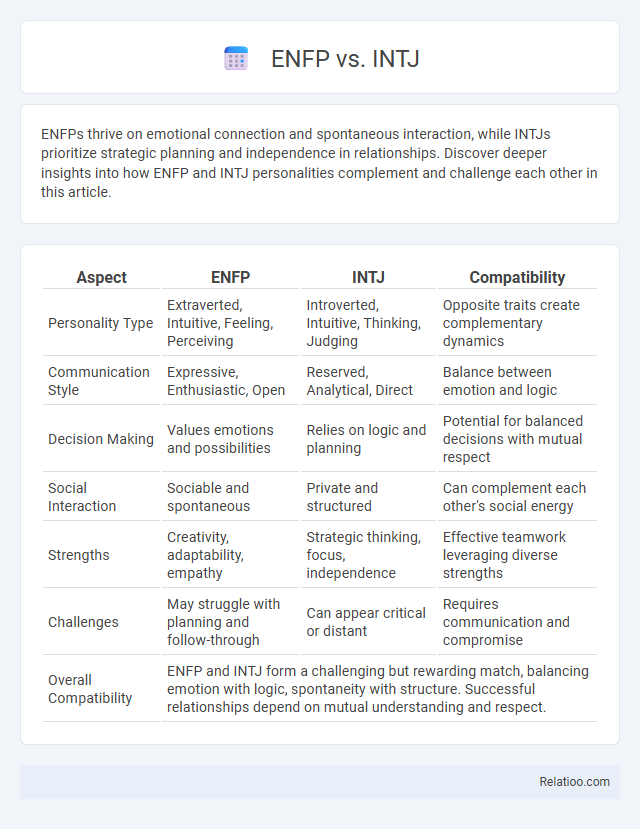ENFPs thrive on emotional connection and spontaneous interaction, while INTJs prioritize strategic planning and independence in relationships. Discover deeper insights into how ENFP and INTJ personalities complement and challenge each other in this article.
Table of Comparison
| Aspect | ENFP | INTJ | Compatibility |
|---|---|---|---|
| Personality Type | Extraverted, Intuitive, Feeling, Perceiving | Introverted, Intuitive, Thinking, Judging | Opposite traits create complementary dynamics |
| Communication Style | Expressive, Enthusiastic, Open | Reserved, Analytical, Direct | Balance between emotion and logic |
| Decision Making | Values emotions and possibilities | Relies on logic and planning | Potential for balanced decisions with mutual respect |
| Social Interaction | Sociable and spontaneous | Private and structured | Can complement each other's social energy |
| Strengths | Creativity, adaptability, empathy | Strategic thinking, focus, independence | Effective teamwork leveraging diverse strengths |
| Challenges | May struggle with planning and follow-through | Can appear critical or distant | Requires communication and compromise |
| Overall Compatibility | ENFP and INTJ form a challenging but rewarding match, balancing emotion with logic, spontaneity with structure. Successful relationships depend on mutual understanding and respect. | ||
Understanding ENFP and INTJ Personality Types
ENFPs exhibit extroverted intuition, valuing creativity and spontaneous connection, while INTJs rely on introverted intuition and strategic planning, emphasizing logic and structure. Understanding these personality types in chemistry highlights their complementary strengths: ENFPs bring imaginative ideas and adaptability, whereas INTJs contribute analytical problem-solving and long-term vision. This dynamic fosters innovative collaborations where emotional insight and rational analysis drive effective teamwork and impactful results.
Core Differences Between ENFP and INTJ
ENFPs are driven by exploration, creativity, and emotional expression, whereas INTJs prioritize structure, strategic planning, and logical analysis. Your ENFP's spontaneous and people-oriented nature contrasts sharply with the INTJ's methodical, independent, and future-focused mindset, creating distinct approaches to problem-solving and decision-making. These core differences in cognitive functions and communication styles often shape the dynamic chemistry between ENFP and INTJ personalities.
Cognitive Functions: ENFP vs INTJ
ENFPs lead with Extraverted Intuition (Ne), driving them to explore possibilities and patterns in the external world, while their auxiliary Introverted Feeling (Fi) governs personal values and emotional authenticity. INTJs prioritize Introverted Intuition (Ni) to form deep, strategic insights and future-oriented visions, supported by Extraverted Thinking (Te) to organize and implement efficient systems. Understanding these cognitive functions highlights how ENFPs thrive on creative exploration and emotional connection, whereas INTJs excel in structured analysis and long-term planning, often influencing their chemistry through complementary perspectives.
Communication Styles in ENFP and INTJ
ENFPs express themselves with enthusiastic, open, and emotionally rich communication, often prioritizing personal connection and spontaneity, which contrasts with INTJs' precise, logical, and strategic style focused on clarity and efficiency. This divergence in communication can create challenges and opportunities in chemistry, where ENFPs seek empathy and exploratory dialogue while INTJs favor structured discussions and goal-oriented conversations. Understanding these communication preferences enhances mutual respect and synergy in partnerships involving these personality types.
Approach to Relationships: ENFP vs INTJ
ENFPs approach relationships with warmth, spontaneity, and a desire for emotional connection, often seeking harmony and open communication, while INTJs prioritize intellectual compatibility, long-term goals, and structured plans for relationship growth. ENFPs engage through empathy and adaptability, promoting dynamic and evolving bonds, whereas INTJs value strategic thinking, independence, and clear boundaries to foster stability and mutual understanding. These differing approaches create complementary relationship dynamics where emotional expressiveness meets strategic vision, influencing chemistry and interpersonal balance between ENFP and INTJ partners.
Decision-Making Processes Compared
ENFPs approach decision-making through an intuitive and values-driven process, often prioritizing possibilities and emotional impact, while INTJs rely on strategic, logic-based analysis focused on long-term outcomes and efficiency. Chemistry between ENFPs and INTJs can be dynamic due to their complementary decision-making styles, where the ENFP's adaptability balances the INTJ's structured approach. Understanding these cognitive functions enhances collaboration by integrating innovative creativity with systematic problem-solving.
Career Paths Suited for ENFP and INTJ
ENFPs thrive in dynamic, people-centered careers such as marketing, counseling, and entrepreneurship, where creativity and interpersonal skills drive success, while INTJs excel in strategic, analytical roles like engineering, research, and executive management due to their logical problem-solving and long-term planning abilities. Chemistry between ENFPs and INTJs in professional settings often leads to innovation, as the ENFP's imaginative ideas complement the INTJ's structured execution, creating balanced teams ideal for startups and complex projects. Understanding these distinct career preferences helps align individuals with paths that maximize their strengths and job satisfaction.
Strengths and Weaknesses: ENFP vs INTJ
ENFPs exhibit strengths in creativity, emotional intelligence, and adaptability, thriving in dynamic social environments, while their weaknesses include being easily distracted and struggling with routine tasks. INTJs excel in strategic thinking, long-term planning, and analytical problem-solving, but may face challenges in emotional expression and flexibility. Chemistry between ENFP and INTJ can be dynamic, balancing ENFP's spontaneity and enthusiasm with INTJ's structure and foresight, though communication differences may require conscious effort to bridge.
Conflict Resolution Styles
ENFPs approach conflict resolution with empathy and open communication, valuing emotional expression and seeking harmony in relationships. INTJs prefer logical analysis and strategic problem-solving, often addressing conflicts by focusing on long-term solutions and objective criteria. Understanding Your unique conflict style can bridge gaps between ENFPs' emotional openness and INTJs' rational planning, fostering balanced and effective resolution.
Tips for Harmonious ENFP-INTJ Interactions
ENFPs thrive on spontaneous emotional expression, while INTJs rely on strategic planning and logical analysis, creating a dynamic balance in relationships. Establish clear communication by respecting INTJ's need for structured time and ENFP's desire for open emotional dialogue to avoid misunderstandings. Emphasize mutual appreciation for each other's strengths, fostering collaboration where ENFPs fuel creativity and INTJs provide direction, enhancing harmonious interactions.

Infographic: ENFP vs INTJ
 relatioo.com
relatioo.com